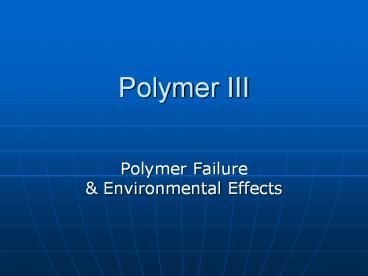Polymer III PowerPoint PPT Presentation
1 / 25
Title: Polymer III
1
Polymer III
- Polymer Failure Environmental Effects
2
Molecular Motions
- Vibration of atoms about equilibrium
- Motion of a few atoms or rotation/vibration of
side groups - Cooperative movement of segments (40-50 atoms
long). - Translational motion of entire molecules.
3
Deformation
- Two Processes in Thermoplastics
- Crazing (amorphous)
- b. Shear Yielding or Shear Flow
4
Deformation Processes
- Crazing
- Amorphous
- Volume increase
- Extremely small
- Solvents assist
5
Craze Process Zone in Fracture
6
Deformation Process
- Shear Yielding or Shear Flow
- Shear stress induced
- Translation of molecules
- Largely irreversible
- Absorbs lots of energy
7
Shear Yielding in Semicrystalline
- Semicrystalline yield is not reversible
- Further yield is possible in which remaining
crystallites also break up.
8
Molecular Orientation
- Failure process depends on molecular orientation
- Generally more orientation greater toughness
9
Fracture in Polymers
- Polymers will undergo slow stable crack growth
(ie. KapplltK1C) - Fracture process zone dominated by either crazing
or shear yielding. - Surface morphology can be complex
10
Fracture Process Zone PE
11
PE Fracture Surface at Different Strain Rates
A
B
C
12
Crack Tip in Polycarbonate
- Very tough amorphous polymer
- Shear yield dominates
- Shear Bands ahead of crack tip
13
Thermoset Deformation Process
- 1. Crazing suppressed
- 3-D polymer network prevents alignment
- Free segments too short
- 2. Shear Yielding only option
- a. Molecular translation restricted by network
- b. High defect sensitivity prevents high shear
strains in tension
14
Fatigue in Polymers
1. Macroscopically brittle 2. Same mechanisms
(shear yield, crazing) 3. Viscoelasticity
complicates picture
15
(No Transcript)
16
(No Transcript)
17
Toughness in Polymers
- Toughness enhanced by improved molecular mobility
(plasticizers, temperature, free volume, lower
crystallinity) - Second phase toughening common (rubber, TP in TS)
- Most fillers reduce toughness
18
Effect of 2nd Phase Tougheners
19
Environmental Effects on Polymers
- Permeable to many gases H2O vapor
20
Environmental Effects on Polymers
- Permeable to many gases H2O vapor
- Inorganic Acids Bases fairly resistant
21
Environmental Effects on Polymers
3. Organic Solvents can be very
sensitive -Crosslinks, crystallinity improves
resistance -Polarity of polymer solvent
important -Solvents swell, dissolve, crack
polymers
22
Environmental Effects on Polymers
- 4. Moisture absorption
- -Polar polymers (PC, Nylon)
- -lowers modulus and yield strength
- -problem in processing
23
Moisture Absorption in Delrin
24
Environmental Effects on Polymers
5. UV Visible light -Chain scission -UV
stabilizers may be added
25
Environmental Effects on Polymers
- 6. Heat
- -Chemical Aging
- -Physical Aging

